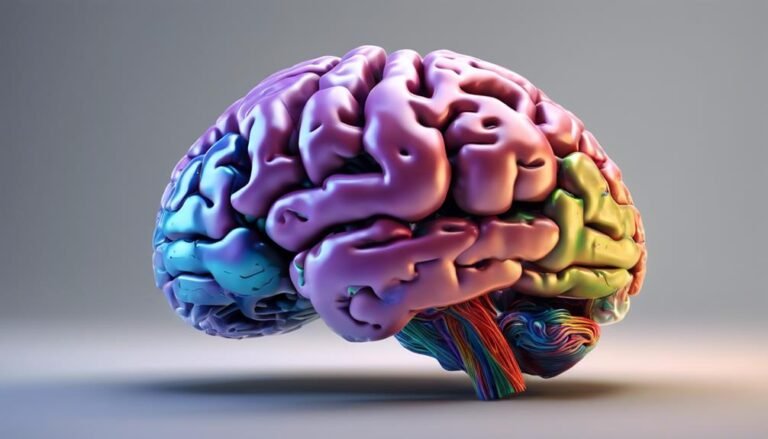Observational Methods in Personality Assessment
In the domain of personality assessment, observational methods serve as a cornerstone for uncovering nuanced aspects of an individual's character. Through keen observation of behaviors and interactions in real-world settings, assessors can glean valuable insights that may elude traditional self-report measures. These methods offer a unique window into the true essence of personality, presenting a rich tapestry of information that goes beyond what words can convey. As we explore the intricacies of observational techniques in personality assessment, a world of untapped potential and profound understanding awaits you.
Key Takeaways
- Observational methods provide authentic insights into personality traits.
- Social interactions and situational factors influence personality observations.
- Qualitative data from case studies reveal hidden personality traits.
- Controlled experiments allow for studying behaviors in varied contexts.
- Behavioral assessments offer accurate insights into underlying personality traits.
Importance of Observational Methods
Observational methods play a crucial role in personality assessment by providing tangible behavioral data that can offer valuable insights into an individual's traits and characteristics. Through case studies and experimental designs, researchers can observe individuals in natural settings, allowing for a more authentic representation of their behaviors. By focusing on social interactions and situational factors, observational methods enable researchers to understand how an individual's personality manifests in different contexts.
Case studies explore in depth the unique characteristics of individuals, providing rich qualitative data that can uncover hidden aspects of personality. On the other hand, experimental designs allow for controlled observations, facilitating the study of specific behaviors under varying conditions. These methods complement each other, offering a comprehensive view of an individual's personality traits.
Additionally, observing individuals in real-life situations provides a more accurate depiction of their behaviors compared to self-reported data. By capturing behaviors as they naturally unfold, observational methods offer a nuanced understanding of an individual's personality, shedding light on both overt and subtle traits.
Types of Observational Techniques
Now, let's explore the different types of observational techniques used in personality assessment.
Behavioral assessments play a significant role in understanding an individual's actions and reactions in various situations.
Interpreting nonverbal cues can provide valuable insights into a person's emotions and intentions without relying solely on verbal communication.
Additionally, considering the influence of the contextual environment is essential to grasp how external factors may impact an individual's behavior and personality traits.
Behavioral Assessments Importance
Different types of observational techniques play an essential role in behavioral assessments to provide valuable insights into an individual's personality traits and characteristics. By observing behavioral patterns, assessment accuracy can be greatly enhanced. Through honing your observational skills, you can gain deeper personality insights that mightn't be apparent through traditional self-report measures.
Behavioral assessments are important in understanding how individuals interact with their environment and others. By carefully observing how a person responds to different situations, you can uncover underlying personality traits that may not be explicitly expressed. These assessments allow for a more thorough evaluation of an individual's behavior in various contexts, contributing to a more holistic understanding of their personality.
Moreover, observational techniques enable the identification of consistent behavioral patterns over time, leading to a more precise assessment of an individual's personality traits. By paying attention to nuances in behavior and interactions, you can uncover valuable information that enhances the overall assessment process. Developing strong observational skills is essential for extracting meaningful insights and ensuring the validity of behavioral assessments.
Nonverbal Cues Interpretation
Interpreting nonverbal cues involves analyzing gestures, facial expressions, and body language to gain insights into an individual's underlying thoughts and emotions. Body language, such as posture and gestures, can reveal a person's level of confidence, openness, or nervousness.
For instance, crossed arms may indicate defensiveness or discomfort, while open gestures like leaning in can signify engagement and interest. Facial expressions are also vital indicators of emotions. A furrowed brow may suggest confusion or concern, while a genuine smile often reflects happiness or agreement.
Observing these nonverbal cues requires attentiveness and a keen eye for detail. It's essential to take into account clusters of gestures and expressions rather than isolated movements to accurately interpret their meaning. Additionally, cultural differences can influence the way individuals express themselves nonverbally, so it's important to be mindful of these variations when evaluating body language and facial expressions.
Contextual Environment Influence
The influence of the contextual environment on observational techniques can greatly impact the accuracy and reliability of personality assessments. Social interactions play a significant role in shaping an individual's behavior and expressions. Observing a person in various social settings can provide valuable insights into their personality traits and tendencies. Environmental factors such as noise levels, lighting, and spatial arrangements can also influence how someone behaves during an assessment.
Personal experiences can heavily influence how a person presents themselves in different situations. For example, someone who's had negative experiences with authority figures may exhibit signs of discomfort or defensiveness when interacting with individuals in positions of power. Cultural influences further shape behavior and communication styles, affecting how individuals express themselves and interpret social cues.
Understanding these contextual factors is essential for accurate personality assessments, as they can impact the observer's interpretation of behaviors and nonverbal cues. By considering the contextual environment, observers can enhance the validity and reliability of their assessments.
Behavioral Coding Systems
Utilizing behavioral coding systems is an essential component of effectively capturing and quantifying observable behaviors in personality assessment studies. Video analysis plays a significant role in this process, allowing researchers to record and analyze behaviors accurately.
Coding systems are employed to categorize behaviors systematically, enabling researchers to collect data consistently across different observations. These systems provide a structured framework for identifying and recording specific behaviors of interest, guaranteeing that the data collected is reliable and valid for analysis.
Reliability measures are integral in evaluating the consistency and dependability of the behavioral coding systems used. By establishing inter-rater reliability, researchers can determine the extent to which different coders agree on the behaviors observed. This measure helps ensure that the data collected isn't influenced by subjective interpretations, enhancing the overall accuracy and credibility of the personality assessment studies.
To summarize, integrating behavioral coding systems, video analysis, and reliability measures is fundamental in conducting thorough and rigorous personality assessments based on observable behaviors.
Interobserver Reliability in Assessment
When considering interobserver reliability in personality assessment, the focus is on the importance and guarantee among different observers in their evaluations. This aspect is vital as it guarantees that the assessment results aren't heavily influenced by individual biases or subjective interpretations.
Consistency in Evaluations
To guarantee the validity and reliability of personality assessments, establishing consistency in evaluations among different assessors is essential in determining interobserver reliability. Observer bias can have a substantial impact on the consistency of evaluations, leading to discrepancies in the data collected.
When assessors introduce subjective interpretation into their assessments, it can raise concerns about the reliability of the results obtained. Inconsistencies in evaluations due to observer bias or subjective interpretations can undermine the overall accuracy of personality assessments.
Assessors must work towards maintaining data consistency by adhering to standardized evaluation criteria and minimizing personal biases during the assessment process. By ensuring that evaluations are consistently conducted across different assessors, the reliability of personality assessments can be enhanced, leading to more robust and accurate results.
Consistency in evaluations plays an important role in mitigating reliability concerns and improving the overall quality of personality assessments.
Agreement Among Observers
Ensuring agreement among observers is essential for establishing interobserver reliability in personality assessment. Observer biases can greatly impact the reliability of assessments, making it important to minimize subjective interpretations.
When multiple observers reach a consensus on the traits or behaviors being evaluated, it enhances the credibility and validity of the assessment process.
Interobserver reliability is achieved when different observers consistently interpret and evaluate the same behaviors or traits in a similar manner. This consistency helps in reducing the impact of individual biases and subjective judgments.
Agreement among observers is necessary for ensuring that the assessment reflects the individual's true personality characteristics rather than the observer's personal perceptions or preferences.
Ethical Considerations in Observation
Ethical integrity is paramount when employing observational methods in personality assessment. Confidentiality concerns and participant consent are vital aspects to take into account in upholding ethical standards. Maintaining confidentiality involves safeguarding the privacy of the individuals being observed, ensuring that their personal information and behavior aren't disclosed without their explicit permission.
Participant consent is equally important, as individuals must willingly agree to participate in the observational process after being informed about the nature and purpose of the assessment.
Adherence to ethical guidelines not only protects the rights of the participants but also upholds the credibility and validity of the personality assessment. Researchers must obtain informed consent from individuals before conducting any observations, clearly outlining the procedures, risks, benefits, and their rights to withdraw from the study at any time.
Additionally, researchers must take measures to protect the identities of the participants and ensure that the data collected is used solely for the intended purpose of the personality assessment. By prioritizing confidentiality and participant consent, researchers can conduct observational methods ethically and responsibly.
Applications in Clinical Settings
Confidentiality and participant consent play essential roles in the application of observational methods in clinical settings for personality assessment.
In clinical practice, observational methods such as direct observation, behavioral coding, and structured interviews are utilized to gather information about an individual's behavior, emotions, and interactions within a therapeutic setting.
These observations are vital for developing detailed case studies that aid in treatment planning and intervention strategies.
Challenges in Personality Observation
What challenges arise when conducting personality observations in clinical settings?
One significant challenge is maneuvering ethical dilemmas that may arise during the observation process. Researchers must guarantee that their observations don't infringe upon the privacy or autonomy of the individuals being observed. This can be particularly complex when observing sensitive aspects of personality or behavior.
Another challenge is securing the accuracy of the data collected through observation. It can be difficult to maintain objectivity and avoid biases that might affect the reliability of the observations. Additionally, the presence of the observer itself can sometimes influence the behavior of the individual being observed, leading to potential inaccuracies in the data.
Furthermore, interpreting the observed behaviors accurately can be a challenge. Different observers may interpret the same behavior differently, leading to discrepancies in the conclusions drawn from the observations.
These challenges highlight the importance of careful planning, training, and supervision when conducting personality observations in clinical settings.
Enhancing Validity and Reliability
Improving the validity and reliability of personality observations in clinical settings requires meticulous attention to detail and consistent adherence to standardized protocols. To increase accuracy, it's essential to establish clear criteria for observation, ensuring that all observers are trained thoroughly in the specific behaviors they need to assess.
Enhancing consistency involves implementing inter-rater reliability checks to minimize subjective biases and variations in ratings between different observers. Utilizing standardized rating scales and observation templates can also aid in maintaining consistency across different assessments.
In addition, regular calibration sessions among observers can help align their judgments and interpretations of behaviors, further enhancing the reliability of the observations. Providing feedback to observers based on their performance can help address any discrepancies and improve the overall quality of assessments.
Future Directions in Assessment
Advancing technology and evolving research methodologies are shaping the future landscape of personality assessment techniques. In the coming years, technology integration will play an essential role in enhancing assessment methods. Innovations like artificial intelligence and machine learning algorithms are likely to revolutionize how personality traits are measured and analyzed. These technological advancements can offer more efficient and objective assessment tools, reducing human biases and errors in the process.
Furthermore, future directions in assessment will focus on cross-cultural applications and catering to diverse populations. As societies become increasingly interconnected, it's essential for personality assessment techniques to be culturally sensitive and applicable across different ethnicities and backgrounds.
Researchers will need to develop assessment tools that are valid and reliable in various cultural contexts, ensuring that personality assessments accurately capture individual differences across the globe.
Conclusion
To sum up, thorough observational methods are invaluable in providing authentic insights into an individual's personality. By considering behavioral cues, contextual influences, and ethical standards, observers can gain a detailed understanding of a person's traits and behaviors.
Like a magnifying glass revealing hidden details, these methods shed light on the complexities of personality.
Moving forward, continued research and development in observational techniques will further enhance the validity and reliability of personality assessments.







